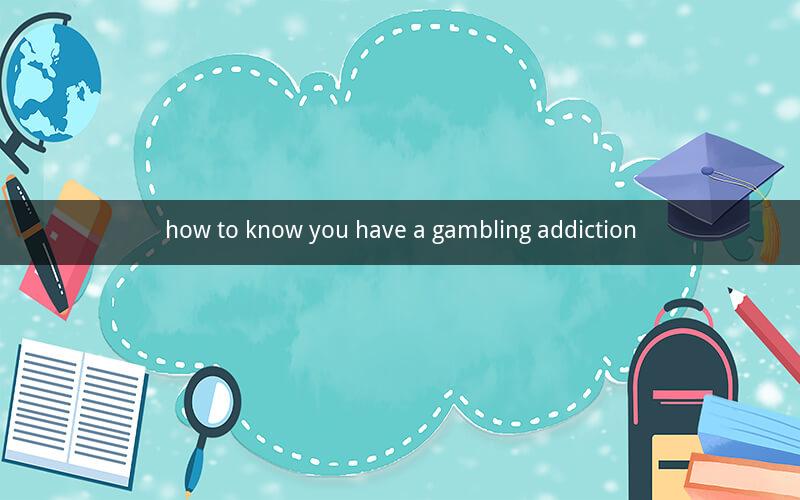
Table of Contents
1. Understanding Gambling Addiction
2. Signs and Symptoms of Gambling Addiction
3. The Impact of Gambling Addiction on Individuals
4. Identifying Risk Factors for Gambling Addiction
5. Recognizing the Psychological Aspects of Gambling Addiction
6. Social and Environmental Influences on Gambling Addiction
7. Assessing Your Gambling Behavior
8. Seeking Professional Help for Gambling Addiction
9. Self-Management Strategies for Overcoming Gambling Addiction
10. Support Systems and Resources for Recovery
1. Understanding Gambling Addiction
Gambling addiction, also known as problem gambling, is a complex disorder characterized by the inability to control or stop gambling despite negative consequences. It is a form of addictive behavior that can lead to significant personal, financial, and social problems.
2. Signs and Symptoms of Gambling Addiction
Identifying gambling addiction involves recognizing a pattern of gambling behavior that causes distress or harm. Common signs and symptoms include:
- Needing to gamble with increasing amounts of money to achieve the desired excitement.
- Feeling restless or irritable when attempting to stop gambling.
- Continually chasing losses in an attempt to win back money.
-Gambling when you have no money left for necessities.
- Using gambling as a way to escape problems or stress.
- Lying to family, friends, or therapists about the extent of your gambling.
3. The Impact of Gambling Addiction on Individuals
The consequences of gambling addiction can be severe. Individuals may experience:
- Financial problems, including debt and bankruptcy.
- Marital or relationship problems.
- Legal issues, such as arrest for fraud or theft.
- Mental health issues, including depression, anxiety, and substance abuse.
- Social isolation and loss of friendships.
4. Identifying Risk Factors for Gambling Addiction
Several factors can increase the risk of developing a gambling addiction, including:
- Genetic predisposition.
- Personal or family history of addiction.
- Impulse control disorders.
- Mental health disorders, such as depression or anxiety.
- Exposure to gambling at an early age.
5. Recognizing the Psychological Aspects of Gambling Addiction
Gambling addiction is often associated with psychological factors, such as:
- The thrill of taking risks.
- The psychological reward of winning.
- The desire to escape from reality.
6. Social and Environmental Influences on Gambling Addiction
Social and environmental factors can also contribute to the development of a gambling addiction, including:
- Easy access to gambling opportunities.
- Peer pressure to engage in gambling activities.
- The normalization of gambling in society.
7. Assessing Your Gambling Behavior
To determine if you have a gambling addiction, consider the following questions:
- Do you feel the need to gamble more and more?
- Have you tried to stop gambling but been unable to?
- Do you gamble to escape problems or stress?
- Has gambling affected your personal or professional life?
- Have you ever lied about your gambling habits?
8. Seeking Professional Help for Gambling Addiction
If you suspect you have a gambling addiction, it is essential to seek professional help. Therapists, counselors, and addiction specialists can provide the necessary support and guidance to overcome this disorder.
9. Self-Management Strategies for Overcoming Gambling Addiction
Self-management strategies can help you control your gambling behavior. These may include:
- Setting strict limits on the amount of money and time spent gambling.
- Removing yourself from tempting environments.
- Developing healthy coping mechanisms for stress and anxiety.
- Joining a support group for individuals with gambling addiction.
10. Support Systems and Resources for Recovery
Recovery from gambling addiction can be challenging, but there are numerous support systems and resources available:
- Gamblers Anonymous: A 12-step program for individuals with gambling addiction.
- National Council on Problem Gambling: Provides resources and support for individuals and families affected by problem gambling.
- Therapists and counselors specializing in addiction and mental health issues.
Questions and Answers
1. Q: Can someone develop a gambling addiction without any risk factors?
A: Yes, although risk factors can increase the likelihood of developing an addiction, some individuals may develop it without any apparent risk factors.
2. Q: How can I tell if my gambling is becoming a problem?
A: If gambling is causing you distress or harm, it may be a problem. Pay attention to how it affects your life and relationships.
3. Q: Can a gambling addiction be cured?
A: While there is no cure for gambling addiction, it can be effectively treated and managed with the right support and strategies.
4. Q: Is there a difference between gambling addiction and problem gambling?
A: Yes, problem gambling refers to a broader spectrum of gambling-related issues, including mild to severe problems, whereas gambling addiction is a more severe form of problem gambling.
5. Q: Can a person recover from a gambling addiction on their own?
A: While some individuals may recover on their own, seeking professional help and joining support groups can significantly improve the chances of successful recovery.
6. Q: Are there medications that can help treat gambling addiction?
A: Medications are not commonly used to treat gambling addiction, but some may be prescribed to address underlying mental health issues.
7. Q: Can a person recover from a gambling addiction without support from family and friends?
A: While recovery is possible without support, having a strong support system can greatly enhance the process.
8. Q: How long does it take to recover from a gambling addiction?
A: Recovery time varies from person to person, but it can take weeks, months, or even years to fully recover.
9. Q: Can a person with a gambling addiction gamble responsibly?
A: It is challenging for individuals with a gambling addiction to gamble responsibly, as the disorder often involves a loss of control over gambling behavior.
10. Q: What are some warning signs that a friend or family member may have a gambling addiction?
A: Warning signs include secretive behavior, increased stress levels, financial problems, and changes in relationships. Encourage them to seek professional help if you suspect they have a problem.